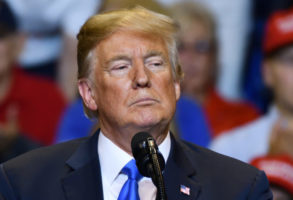
Published June 8, 2018
Thursday night, the Trump Administration’s Department of Justice filed a very unusual brief in a federal district-court case in which several states are asking to have Obamacare overturned. It was an odd move and a mistake—one that seems to me to run the risk of reinforcing some of the worst habits and precedents of the Obama era, and to introduce some new bad habits and precedents too.
Robert VerBruggen offered a very good rundown of the case here. The states are arguing that, because the 2017 tax bill zeroed out the individual-mandate penalty in Obamacare, the mandate can no longer be considered a tax and that, since the mandate was upheld by the Supreme Court in 2012 on the basis of its being a tax, it now can no longer be upheld. Not just that, they argue, because the mandate was central to the policy logic of the whole of Obamacare, if it is now struck down as unconstitutional the entirety of the law should be too.
The administration’s brief notified the court that the Department of Justice will no longer be defending the statute in this case, and that DOJ agrees with the plaintiff states that the mandate should now be considered unconstitutional and should take at least some provisions of Obamacare down with it.
You won’t find many people more opposed to Obamacare than I am. But there is a difference between policy preferences and legal and constitutional principles—a difference we have seen badly eroded in our politics in recent years. The role of the Department of Justice in a case like this has got to be grounded in some recognition of that difference, and that just didn’t happen here.
The brief can be thought about in three elements, which I would respectively describe as troubling, trivial, and absurd.
The troubling part is the basic fact of the administration’s refusal to defend in federal court a law enacted by (a past) Congress and signed by (a past) president. Here I think Trump’s DOJ is adopting a bad precedent set by Obama’s DOJ.
Because the presidency changes hands every four or eight years, there are inevitably many laws on the books that the president in office at any given time is not a fan of. But that president and his administration are nonetheless required to take care that these laws, like all laws, are faithfully executed. This has generally been understood to also require the administration to defend such laws in court when they are challenged and can be defended. Administrations of all parties have normally done this, and the exceptions to that rule are very few and far between. The most notable and relevant such exception recently has been the Obama Administration’s refusal to defend in court the Defense of Marriage Act when it was challenged in 2011.
That move is obviously the precedent the Trump administration is relying on. Although some commentators today have tried to draw decisive distinctions between the two, the similarities are pretty plain, and are only made more so by some of the attempts to deny them. Here for instance is an attempt to draw such a distinction by one of the smartest health-law experts on the left, Nicholas Bagley:
Indeed, is there any precedent for this? Odds are we’re going to hear a lot in the coming days about the Obama administration’s decision not to defend the Defense of Marriage Act. There, however, we had a question about the meaning of the Constitution that struck deep on questions about fundamental values. Just as we no longer believe it’s constitutional to offer federal mortgage insurance only in white neighborhoods, the Justice Department concluded that we, as a country, had come around to the view that it was no longer constitutionally tenable to deny equal rights to gay people.
Whether you agree or disagree with the Justice Department’s decision—and it made lots of line attorneys nervous—it was moored to the public’s evolving sense about what the Constitution meant. By 2011, a justification that once seemed unobjectionable had come to seem untenable.
On its face, this is sheer sophistry. But Bagley, whose work I’ve always found to uphold a very high standard, is no sophist. I think what an argument like this probably means is that Bagley actually does not object in principle to the notion that a president with certain strongly-held views about the Constitution and the proper direction of constitutional law should have his Justice Department pursue litigation strategies in keeping with those views. He just thinks Obama’s views were valid and Trump’s are not.
If that’s right, he ought to be more clear about it. That a president should advance his own constitutional interpretation in his mode of governing is not at all unreasonable—and I certainly think it’s right as a way of approaching the president’s relationship with Congress. A president should veto laws he deems unconstitutional, for instance, and not just leave it to the courts to figure it out. But whether his administration’s lawyers should decline to defend in court a law the administration is enforcing is another question. The answer is not self-evident, but I incline toward the precedent that preceded Obama’s DOMA decision and was badly undermined by it.
Either way, however, it seems perfectly plain that the answer to Bagley’s opening question above is: yes, there is a precedent for this from the Obama years. I also tend to think it is a precedent that should be rejected, like so much of the Obama administration’s ruinous legacy in constitutional law. So this part is troubling.
But the Trump administration’s argument here is worse than a needless adoption of that precedent. The immediate effect of just declining to defend the constitutionality of the mandate would not be very great, since Congress has already effectively ended the mandate. If the Department of Justice had simply said that by Chief Justice Roberts’s own (twisted) logic, the mandate that was defensible as a tax can no longer be defensible when it is not attached to a monetary assessment, they might have at least been left making a plausible interpretive point on its face—that is, offering one plausible reading, even if not the one they ought to offer as the government’s legal representatives, of what passes for the law after the Court’s bizarre 2012 decision. I still think that’s not quite right, since it would be strange to read Congress’s zeroing out of the mandate penalty as making the mandate more offensive constitutionally. But the Chief Justice put us in this theater of the absurd and we can hardly be surprised when the plot makes no sense. It also would not matter much in practice: Since Congress has already zeroed out the mandate, to now say the nullity that remains should be struck down as unconstitutional is not to say much as either a constitutional matter or a matter of health-care policy. By itself, this would be relatively trivial.
But the administration did more than that. It waded into the argument, advanced by the state attorneys general in this case, that if the mandate is struck down (rather than just zeroed out) it must take other provisions of the law with it, since they depend on the mandate and cannot be severed from it.
The states in this case are actually arguing that the entirety of the law needs to be struck down under this logic. The administration, perhaps in an effort to restrain that argument and defend other elements of the law, advanced the argument that just two key provisions of the law—the so-called “guaranteed issue” and “community rating” provisions, prohibiting insurers from refusing to sell and from charging higher premiums to consumers based on their health status—are in fact dependent on the mandate in the scheme established by the original statute and so should fall if it falls.
This argument strikes me as simply absurd and indefensible given the straightforward fact that Congress passed a new statute that altered the original one by zeroing out the individual mandate while leaving in place the other provisions. To continue to insist that the intent of Congress was to make these provisions—which Congress severed from each other—inseverable from each other just makes no sense. It is hard to imagine that DOJ’s lawyers really credit this argument, and even harder to imagine any judge taking it seriously.
Obamacare was a bad law that advanced bad policy and fit very poorly with the structure of our constitutional system. It would be good to replace it with better policy rooted in a realistic and constitutionally-grounded understanding of the proper federal role in American life. But none of that justifies any of this. To suggest that it does, and so to thoroughly confound law and policy, is to repeat and reinforce the very worst of the counter-constitutional cynicism that characterized the Obama administration’s approach to this statute, to DOMA, and to the separation of powers. Let’s not.
— Yuval Levin is the editor of National Affairs and a fellow at the Ethics and Public Policy Center.








